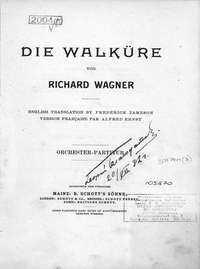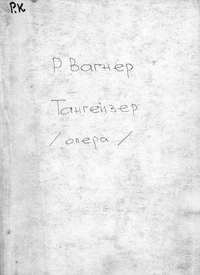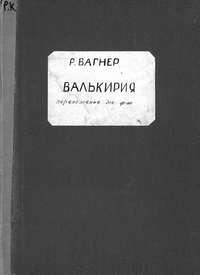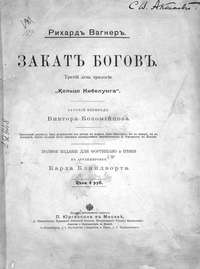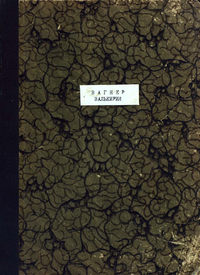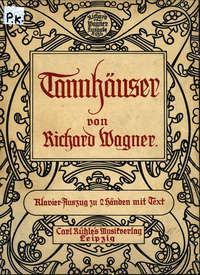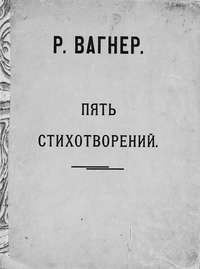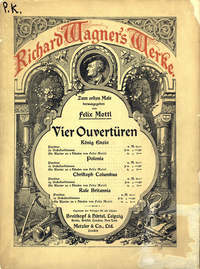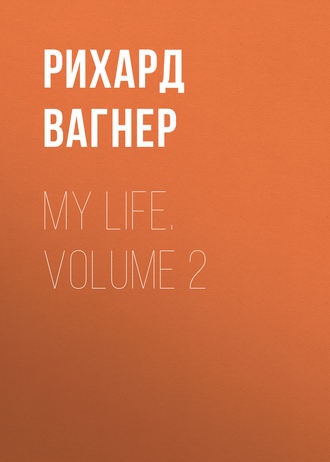 полная версия
полная версияMy Life. Volume 2
But my patroness, undaunted still, endeavoured to helpme in every conceivable way demanded by my necessities. In order to gratify my most earnest longing for a peaceful home where I could stay for a while, she managed to secure the house of the English attache, a son of the famous Bulwer Lytton, who had been called away, but was keeping up his establishment for some time longer. Thus through her I was introduced to this exceedingly amiable young man. I dined with him one evening, together with Cornelius and Mme. Kalergis, and after dinner began to read them my Gotterdammerung. I did not seem to have secured a very attentive audience, however, and when I noticed this I stopped and withdrew with Cornelius. We found it very cold as we went home, and Bulwer's rooms seem also to have been insufficiently heated, so that we took refuge in a restaurant to drink a glass of hot punch. The incident has remained fixed in my memory because here for the first time I saw Cornelius in an ungovernably eccentric humour. While we thus took our pleasure, Mine. Kalergis used her influence—so I was afterwards informed—as an exceedingly powerful and irresistible female advocate to inspire Bulwer with a definite interest in my fate. In this she so far succeeded, that he unconditionally placed his house at my disposal for nine mouths. On considering the matter more deeply, however, I did not see what advantage this would be to me, seeing that I had no further prospect of earning any income in Vienna for my sustenance.
On the other hand, my plans were decided for me by an offer which reached me from St. Petersburg to conduct two concerts there in the month of March for the Philharmonic Society for a fee of two thousand silver roubles. For this also I had to thank Mme. Kalergis, who urgently counselled me to accept the invitation, holding out at the same time a prospect of further increasing my receipts by giving an additional concert on my own account, from which very important material results might be expected. The only thing which could have induced me to decline this invitation would have been an assurance that my Tristan would be staged in Vienna during the next few months; but a fresh indisposition on the part of the tenor Ander had once more brought our preparations to a standstill, and moreover I had completely lost all faith in those promises which had lured me again to Vienna. To this the effect of my visit to the minister Schmerling immediately on my return to Vienna had certainly contributed. This man had been much astonished at my referring to a recommendation by Prince Metternich, for the latter, so the minister declared, had never spoken a word to him about me. Nevertheless, he very politely assured me that it needed no such recommendation to interest him in a man of my merit. When, therefore, I mentioned the idea suggested by Prince Metternich's kindness that the Emperor might assign me some special position in Vienna, he hastened at once to inform me that he was completely powerless to influence any of the Emperor's decisions. This admission on the part of Herr von Schmerling certainly helped to explain Prince Metternich's behaviour, and I concluded that the latter had preferred an attempt to win the Chief Chamberlain for a serious revival of Tristan to a fruitless effort with the minister.
As these prospects were therefore thrust into the uncertain future, I now agreed to the St. Petersburg proposal, but first of all sought about for means to provide the necessary funds. For these I relied on a concert which Heinrich Porges had already arranged for me in Prague. Consequently early in February I set out for that city, and had every reason to be satisfied with my reception there. Young Forges, an out-and-out partisan of Liszt and myself, pleased me greatly, not only personally, but by his obvious enthusiasm. The concert took place at the hall on the Sophia Island, and was crowned with great success. Besides one of Beethoven's symphonies, several selections from my newer works were given, and when next day Porges paid me about two thousand marks, with the reservation of a few smaller supplementary payments, I laughingly assured him that this was the first money I had ever earned by my own exertions. He also gave me some very pleasant introductions to several exceedingly devoted and intelligent young people, belonging both to the German and Czech parties, and among them to a teacher of mathematics called Lieblein, and an author whose name was Musiol. It was with a certain pathetic interest that, after so many years, I here discovered a friend of my earliest youth, named Marie Lowe, who had given up singing and taken to the harp instead, and was now engaged to play this instrument in the orchestra, in which capacity she assisted at my concert. On the occasion of the first performance of Tannhauser in Prague, she had sent me a most enthusiastic report about it. Her admiration was now intensified, and for many years afterwards she remained tenderly attached to me. Well satisfied then, and filled with newly awakened hope. I hurried back to Vienna again in order to put the arrangement for Tristan on as firm a basis as possible. It was found feasible to arrange another pianoforte rehearsal in my presence of the two first acts, and I was astonished at the really passable performance of the tenor, while from Frau Dustmann I could not withhold my sincerest congratulations on her admirable execution of her difficult part. It was therefore decided that my work should be produced a little after Easter, which would fit in very well with the expected date of my return from Russia.
The hope of being now able to count on earning a large income decided me to revive my former idea of settling for good in the peace and quiet of Biebrich. As there was still time before I had to start for Russia, I returned to the Rhine to arrange matters there as rapidly as possible. Once more I lodged in Frickhofer's house, and in the company of Mathilde Maier and her friend Luise Wagner once more hunted through the Rheingau in search of a suitable house. Not finding what I wanted, I finally entered into treaty with Frickhofer for the erection of a small cottage on a plot of land I proposed to buy near his villa. Dr. Schuler, the man who had been introduced to me by young Stadl, was to take the matter in hand, as he had both legal and business experience. Estimates were prepared, and it now depended entirely on the amount of my Russian receipts as to whether the undertaking could be begun in the following spring or not. As in any case I had to give up my rooms in Frickhofer's house at Easter, I removed all my furniture and sent it packed to the furniture-dealer in Wiesbaden, to whom I was still indebted for the greater part of it.
Thus in the best of spirits I went first to Berlin, where I called at once on Bulow. Cosima, who was expecting an early confinement, seemed delighted to see me again, and insisted on accompanying me at once to the music-school, where we should find Hans. I entered a long room, at one end of which Bulow was giving a music-lesson. As I stood for some time in silence in the doorway, he gave an exclamation of anger at being disturbed, only to burst out into joyful laughter on recognising who it was. Our midday meal together was lively, and in excellent humour I set out with Cosima alone for a drive in a fine carriage (belonging to the Hotel de Russie), whose grey satin lining and cushions provided us with endless fun. Bulow seemed troubled that I should see his wife in a condition of advanced pregnancy, as I had once expressed my aversion from such a sight when speaking of another woman of our acquaintance. It put us into a good-humour to be able to set his mind at rest in this case, for nothing could possibly put me out of sympathy with Cosima. So, sharing my hopes and heartily rejoicing in the turn of my fortune, these two friends accompanied me to the Konigsburg railway station and saw me off on my long night journey.
In Konigsburg I had to wait half a day and a night. As I had no desire to revisit my haunts in a place which had once been so fatal to me, I spent the time quietly in the room of an hotel, the position of which I did not even try to fix, and early in the morning continued my journey towards the Russian frontier. With certain uneasy memories of my former illegal passage of this frontier, I carefully scanned the faces of my fellow-passengers during the long hours of travel. Among these I was especially struck by one, a Livland nobleman of German descent, who, in the haughtiest German Tory tone, proclaimed his disgust at the Tsar's emancipation of the serfs. He wished me clearly to understand that any efforts on the part of the Russians to obtain their freedom would receive but scant support from the German nobles settled in their midst. But as we approached St. Petersburg I was genuinely frightened to find our train suddenly stopped and examined by the police. They were apparently searching for various persons suspected of complicity in the latest Polish insurrection, which had just broken out. Not far from the capital itself the empty seats in our carriage were filled by several people, whose high Russian fur caps aroused my suspicions, which were not allayed by the attention which their wearers bestowed upon me in particular. But suddenly the face of one of them brightened up, and he impulsively turned towards me and saluted me as the man whom he and several other musicians of the Imperial orchestra had come out on purpose to meet. They were all Germans, and on our arrival at the St. Petersburg railway station they joyfully introduced me to a further large contingent from the orchestra, headed by the committee of the Philharmonic Society. I had been recommended to a German boarding-house on the Newsky Prospect as a suitable residence. There I was very graciously and flatteringly received by Frau Kunst, the wife of a German merchant, in a drawing-room whose windows commanded a view of the wide and busy street, and where I was very well served. I dined in common with the other boarders and visitors, and often invited Alexander Seroff, whom I had formerly known in Lucerne, to be my guest at table. He had called on me immediately on my arrival, and I learned that he held a very poor appointment as censor of German newspapers. His person bore signs of much neglect and ill-health, and proved that he had had a hard struggle for existence; but he speedily won my respect by the great independence and truthfulness of his opinions, whereby, combined with an excellent understanding, I soon learned that he had won himself a reputation as a most influential and much-dreaded critic. I appreciated this better later on when advances were made to me from high quarters to use my influence with Seroff to assuage the bitterness of his persecution of Anton Rubinstein, who just at that time was being somewhat offensively patronised. On my mentioning the matter to him, he explained his reasons for believing Rubinstein's influence in Russia to be pernicious, whereupon I begged him, for my sake at least, to hold his hand a little, as I did not wish, during my brief stay in St. Petersburg, to pose as Rubinstein's rival. To this he replied with all the violence of a sickly man, 'I hate him, and cannot make any concessions.' With me, on the contrary, he entered into the most intimate understanding, as he had so perfect an appreciation of me and my art that our intercourse became almost one of mere pleasantry, for on all serious points we were in entire agreement. Nothing could equal the care with which he sought to help me at every opportunity. He provided the necessary translation into Russian, both of the songs contained in the selections taken from my operas and of my explanatory programme for the concerts. He also displayed the utmost judgment in choosing the most suitable singers for me, and for this he appeared to find abundant recompense in attending the rehearsals and performances. His radiant face beamed everywhere upon me with encouragement and fresh inspiration. I was eminently satisfied with the orchestra which I managed to gather around me in the large and handsome hall of the Society of Nobles. It contained one hundred and twenty picked players from the Imperial orchestras, who were for the most part excellent musicians, usually employed in accompanying Italian opera and ballets. They now seemed delighted to be allowed to breathe more freely in thus occupying themselves with nobler music under a method of conducting which I had made peculiarly my own.
After the great success of my first concert advances were made to me from those circles to which, as I could very well understand, I had been secretly but influentially recommended by Mme. Kalergis. With great circumspection my unseen protectress had prepared the way for my presentation to the Grand Duchess Helene. I was instructed, in the first place, to make use of a recommendation from Standhartner to Dr. Arneth, the Grand Duchess's private physician, whom he had known in Vienna, in order through him to be introduced to Fraulein von Rhaden, her most confidential lady-in-waiting. I should have been well content with the acquaintance of this lady alone, for in her I learned to know a woman of wide culture, great intelligence, and noble bearing, whose ever-growing interest in me I perceived to be mingled with a certain timidity, apparently concerned chiefly with the Grand Duchess. She gave me the impression that she felt something more important ought to happen for me than, from the spirit and character of her mistress, she could expect. I was, however, not taken to pay my respects to the Grand Duchess at once, but received first of all an invitation to an evening party in the apartments of the lady-in-waiting, at which, among others, the Grand Duchess herself was to be present. Here Anton Rubinstein did the musical honours, and after the hostess had introduced me to him, she ventured to present me to the Grand Duchess herself. The ceremony went off fairly well, and, as a result, I shortly afterwards received a direct invitation to a friendly evening tea-party at the Grand Duchess's house. Here, in addition to Fraulein von Rhaden, I met the lady next to her in rank, Fraulein von Stahl, as well as a genial old gentleman, who was introduced to me as General von Brebern, for many years one of the Grand Duchess's closest friends. Fraulein von Rhaden appeared to have made extraordinary efforts on my behalf, which for the present resulted in the Grand Duchess expressing a wish that I should make her better acquainted with the text of my Nibelungen Ring. As I had no copy of the work with me, although Weber of Leipzig ought by this time to have finished printing it, they insisted that I should at once telegraph to him in Leipzig to send the finished sheets with the utmost despatch to the Grand Duchess's address. Meanwhile my patrons had to be content with hearing me read the Meistersinger. To this reading the Grand Duchess Marie was also induced to come—a very stately and still beautiful daughter of the Tsar Nicholas, who was notorious for the passion she had shown throughout her life. As to the impression made upon this lady by my poem, Fraulein von Rhaden only told me that she had been seriously alarmed lest Hans Sachs might end by marrying Eva.
In the course of a few days the loose proof-sheets of my Nibelungen work duly arrived, and the Grand Duchess's intimates met at four tea-parties to hear me read it, and listened with sympathetic attention. General von Brebern was present at them all, but only, as Fraulein von Rhaden said, 'to blush like the rose' in profoundest slumber, a habit which always afforded a subject for merriment to Fraulein von Stahl, a very lively and beautiful woman, when each night I accompanied the two court ladies from the spacious salons along endless corridors and staircases to their distant apartments.
The only other person in the great world whom I learned to know here was Count Wilohorsky, who occupied a high position of trust at the Imperial court, and was chiefly esteemed as a patron of music, and considered himself a distinguished violoncello-player. The old gentleman appeared well disposed towards me, and altogether satisfied with my musical performances. Indeed, he assured me that he had first learned to understand Beethoven's Eighth Symphony (in F major) through my interpretation. He also considered that he had fully grasped my overture to the Meistersinger, and said the Grand Duchess Marie was affected because she had found this piece incomprehensible, but had expressed herself enraptured by the overture to Tristan, which he himself only managed to understand by the exertion of all his musical knowledge. When I told Seroff of this, he exclaimed enthusiastically, 'Ah, that beast of a Count! That woman knows what love is!'
The Count arranged a splendid dinner in my honour, at which both Anton Rubinstein and Mme. Abaza were present. As I begged Rubinstein to play something after dinner, Mme. Abaza insisted on singing his Persian songs, which seemed greatly to annoy the composer, as he knew very well that he had produced much finer work. Nevertheless both the composition and its execution gave me a very favourable opinion of the talents of both artists. Through this singer, who had originally had a professional engagement in the Grand Duchess's household, and was now married to a wealthy and cultured Russian gentleman of rank, I obtained an entry into the house of M. Abaza, who received me with great ceremony. About the same time a certain Baron Vittinghof had also made himself known to me as an enthusiastic lover of music, and honoured me with an invitation to his house, where I met once more with Ingeborg Stark, the beautiful Swedish pianist and composer of sonatas, whom I had formerly known in Paris. She amazed me by the impertinent outburst of laughter with which she accompanied the performance of one of the Baron's compositions. On the other hand, she assumed a more serious air when she informed me that she was engaged to Hans von Bronsart.
Rubinstein, with whom I exchanged friendly visits, behaved very creditably, although, as I had expected, he felt himself somewhat injured by me. He told me that he was thinking of resigning his position in St. Petersburg, as it had been made difficult by Seroff's antagonism. It was also thought advisable to introduce me to the commercial circles of St. Petersburg, with a view to my coming benefit concert, and a visit was consequently arranged to a concert in the hall of the Merchants' Guild. Here I was met on the staircase by a drunken Russian, who announced himself as the conductor. With a small selection of Imperial musicians and others, he conducted the overtures of Rossini's Tell and Weber's Oberon, in which the kettledrums were replaced by a small military drum, which produced a wonderful effect, especially in the lovely transfiguration part of the Oberon Overture.
Although I was admirably equipped for my own concerts as far as the orchestra was concerned, yet I had much trouble in procuring the requisite singers. The soprano was very passably represented by Mlle. Bianchi; but for the tenor parts I had to make shift with a M. Setoff, who, although possessing plenty of courage, had very little voice. But he managed to help me through the 'Schmiede-Lieder' in Siegfried, for his presence at least gave an appearance of song, while the orchestra alone undertookthe effective reality. On the conclusion of my two concerts for the Philharmonic Society, I set seriously to work on my own concert, which was to be held in the Imperial Opera House, in the material arrangements for which I was helped by a retired musician. This man often spent hours with Seroff in my well-heated rooms without laying aside his enormous fur coat, and as his incapacity gave us a great deal of trouble, we agreed that he was like 'the sheep in wolf's clothing.' The concert, however, succeeded beyond all my expectations, and I do not think I was ever so enthusiastically received by any audience as on this occasion. Indeed, their greeting when I first appeared was so loudly prolonged that I felt quite touched, a rare occurrence with me. To this wild abandonment on the part of the audience the ardent devotion of my orchestra naturally contributed, as my one hundred and twenty musicians renewed the frantic acclamations again and again, a procedure which appeared to be quite novel in St. Petersburg. From some of them I heard such exclamations as, 'We must admit we have never known what music is till now.'
Conductor Schuberth, who, with a certain amount of condescension, had helped me with advice on business matters, now utilised this favourable turn of affairs to ask for my co-operation at a concert to be given shortly for his own benefit. Although I was fully aware that by this means he reckoned on conjuring a handsome profit out of my pocket into his own, yet on the advice of my friends I thought it best to comply with his request, albeit much against the grain. So a week later I repeated the most popular items of my programme before an equally numerous audience and with the same success, but this time the handsome receipts of three thousand roubles were destined for an invalid man, who as a retribution for this encroachment on my rights was suddenly summoned to another world in the same year.
To balance this, I now had a prospect of further artistic and material successes from a contract concluded with General Lwoff, the manager of the Moscow theatre. I was to give three concerts in the Grand Theatre, of which I was to have half the receipts, guaranteed in each case at a minimum of one thousand roubles. I arrived there suffering from a cold, miserable and ill at ease, in weather which was a mixture of frost and thaw, and put up at a badly situated German boarding-house. My preliminary arrangements were made with the manager, who, in spite of the orders hanging from his neck, looked a very insignificant person, and the difficult selection of the vocal items had to be arranged with a Russian tenor and a superannuated Italian lady-singer. Having settled these, I entered upon the task of orchestral rehearsals. It was here that I first met the younger Rubinstein, Anton's brother Nicholas, who, as director of the Russian Musical Society, was the leading authority in his profession in Moscow; his demeanour towards me was characterised throughout by modesty and consideration. The orchestra consisted of the hundred musicians who provided the Imperial household with Italian opera and ballet. It was, on the whole, far inferior to that of St. Petersburg, yet among them I found a small number of excellent quartette players, all devotedly attached to me. Among these was one of my old Riga acquaintances, the 'cellist von Lutzau, who in those days had a great reputation as a wag. But I was particularly pleased with a certain Herr Albrecht, a violinist, a brother of the Albrecht who was one of the party whose Russian fur caps had so scared me on my way to St. Petersburg. But even these men could not dispel my feeling that in dealing with this Moscow orchestra I had descended in the artistic scale. I gave myself a great deal of trouble without deriving any compensating satisfaction, and my bile was not a little stirred by the Russian tenor, who came to rehearsal in a red shirt, to show his patriotic aversion from my music, and sang the 'Schmiede-Lieder' of Siegfried in the insipid style acquired from the Italians. On the very morning of the first concert I was obliged, to cancel it, and declare myself on the sick-list, with a bad, feverish cold. In the slush and snow which inundated the streets of Moscow it seems to have been impossible to announce this fact to the public, and I heard that angry disturbances resulted when many splendid equipages arrived on a fruitless errand and had to be turned away. After three days' rest I insisted on giving the three concerts I had contracted for within six days, an exertion to which I was spurred by a desire to have done with an undertaking I felt was not worthy of me. Although the Grand Theatre was filled on each occasion with a brilliant audience such as I had never before seen, yet, according to the calculations of the Imperial manager, the receipts did not exceed the amount of the guarantee. With this, however, I was content, considering the magnificent reception accorded to my efforts, and above all the fervid enthusiasm of the orchestra, which was expressed here as it had been in St. Petersburg. A deputation of members of the orchestra begged me to give a fourth concert, and on my refusal, they tried to persuade me to remain for another 'rehearsal,' but this too I was compelled to decline with a smile. However, the orchestra honoured me with a banquet, at which, after N. Rubinstein had made a very enthusiastic and appropriate speech, which was greeted with hearty and tumultuous applause, one of the company hoisted me on to his shoulders and carried me round the hall; whereupon there was a great outcry, and every one wanted to render me the same kindly service. I was presented on this occasion with a gold snuff-box from the members of the orchestra, on which was engraved the words 'Doch Einer kam,' from Siegmund's song in the Walkure. I returned the compliment by presenting to the orchestra a large photograph of myself, on which I wrote the words 'Keiner ging,' from the same song.


